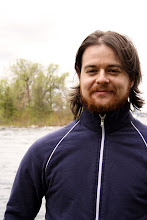I just finished recording a 4 song EP in Toronto at Canterbury studios. This experience brought to light certain insights regarding improvisation in a musical and sound engineering context. Come to think of it, a social context as well. Actually, even the preparation of the music, or the process of composing the music was a collaborative and improvisational process. I guess pretty much every element of this process has been touched by the spirit of improvisation. Let me start by quoting the great jazz pianist Keith Jarrett,
"If you already have a piece of music ingrained in your body, why would you not play it?"
"I don't like recording studios - except my own, which is just a little room above the garage"
"Once we're inside a tune, we can do anything with it."
"Jazz is there and gone. It happens. You have to be present for it. That simple."
Here is one of the tracks we recorded. It features a set compositional structure with improvisation worked into it. There is one extended section featuring bass and marimba. This was entirely improvised with some parameters. Myself and the bassist used thematic material from the composed portion of the song as a starting point for improvisation. The thematic material is the first branch of a recursive dance that continues until a spontaneous decision we make reverses the process of growth and allows the improvisation to metamorphose back into the composed section of the song. The song is called Wanting.
I'd like to describe my recording experience as it relates to these 4 insights. We'll start here and who knows where we'll end up. Think through these 4 quotes and I'll be back soon with my take on them and my experience.
Sunday, April 27, 2008
Tuesday, April 15, 2008
Introduction
Improvisation is something that fascinates me. I am an active musician and teacher and embrace this concept in my approaches to both. My instrument of choice, or maybe more appropriately, the instrument that chose me is, the vibraphone. A lot of the music I play can be said to grow out of the Jazz tradition. I am passionately connected to music and the art of composition.
I feel as though improvisation permeates every aspect of our lives and if we can learn to recognize and embrace it, we can work to focus ourselves, becoming more productive, spiritually aware, observant human beings. I think people often consider improvisation to be synonymous with randomness or a chaos. This to me is not the case, as it is my belief there is some underlying order, and intent (on some level) always accompanying an improvisation. An act of randomness is not necessarily improvised. This is one of the ideas I'd like to get more into and it will take us to more philosophical places. I would like to briefly introduce some of the other topics I will be exploring. I want to open up a dialogue regarding improvisation/spirituality (not necessarily in a religious context), improvisation/music, improvisation/everyday life (including day to day communication, conversation, learning, problem solving), improvisation/composition (writing music, plays, painting), improvisation/nature (bird songs, dolphins, whales...), and improvisation as meditation. I would also like to discuss some of the literature around this issue including, Kenny Werner's, Effortless Mastery, Rafi Zabor's, The Bear Comes Home, Stephen Nachmanovitch's, Free Play, Robert M. Pirsig's, Zen and the Art of Motorcycle Maintenance, and Douglass Hofstadter's, Godel, Escher, Bach. These are just a few of the many concepts I hope to delve deeply into here. My approach to this blog will be one defined by improvisation, so I hope that new topics will branch out from those above, creating a vast, intricate web of ideas and insight. It should be fun.
I feel as though improvisation permeates every aspect of our lives and if we can learn to recognize and embrace it, we can work to focus ourselves, becoming more productive, spiritually aware, observant human beings. I think people often consider improvisation to be synonymous with randomness or a chaos. This to me is not the case, as it is my belief there is some underlying order, and intent (on some level) always accompanying an improvisation. An act of randomness is not necessarily improvised. This is one of the ideas I'd like to get more into and it will take us to more philosophical places. I would like to briefly introduce some of the other topics I will be exploring. I want to open up a dialogue regarding improvisation/spirituality (not necessarily in a religious context), improvisation/music, improvisation/everyday life (including day to day communication, conversation, learning, problem solving), improvisation/composition (writing music, plays, painting), improvisation/nature (bird songs, dolphins, whales...), and improvisation as meditation. I would also like to discuss some of the literature around this issue including, Kenny Werner's, Effortless Mastery, Rafi Zabor's, The Bear Comes Home, Stephen Nachmanovitch's, Free Play, Robert M. Pirsig's, Zen and the Art of Motorcycle Maintenance, and Douglass Hofstadter's, Godel, Escher, Bach. These are just a few of the many concepts I hope to delve deeply into here. My approach to this blog will be one defined by improvisation, so I hope that new topics will branch out from those above, creating a vast, intricate web of ideas and insight. It should be fun.
Subscribe to:
Posts (Atom)

